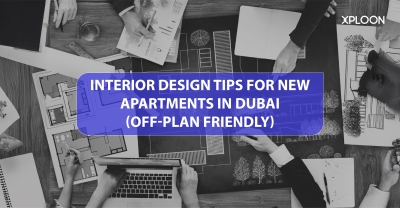
Property Handover in Dubai: What Buyers Should Expect?
21-Aug, 2025
Haniya Yashf...
Haniya Yashfeen AThe Guide
Buying a property in Dubai is exciting. You’ve done your research and chosen the perfect apartment or villa, and now comes the final step, the property handover.
Whether you’re a seasoned investor or a first-time property buyer in Dubai, understanding the property handover process is essential. From legal steps and inspections to handover fees and utility setup, this guide covers everything you need to know before collecting your keys.
What Is Property Handover in Dubai?
Property handover is the official process by which a developer transfers ownership of the property to the buyer. It happens after construction is complete and all legal and technical requirements are met.
For off-plan properties, handover occurs after the project’s completion, whereas for ready units, it follows the final payment and completion of paperwork.
But it’s not just about taking the keys; it involves multiple steps, inspections, and payments. Let’s walk you through it.
Step-by-Step Process of Property Handover in Dubai
Here’s what the Dubai property handover process looks like:
1. Completion Notice
Once your property is ready, the developer will send a completion notice. This means the project is complete and approved by the Dubai Land Department (DLD).
Here’s what happens:
- The developer notifies DLD of the project’s completion.
- DLD then issues a completion notice, giving the buyer 30 days to complete the formalities for handover.
- This notice includes a Property Index Number (PIN), required for registering Ejari and setting up DEWA (utilities).
- The developer forwards this notice to the buyer.
If you don’t receive the notice, follow up with the DLD immediately. Failing to meet the deadline could result in penalties.
2. Property Inspection (Snagging)
Before you accept the keys, you’re entitled to do a full inspection of the property. This is your chance to check if the unit matches what was promised, both in quality and features.
- Paint issues, cracks, and water damage
- Electrical and plumbing defects
- Incomplete fixtures or fittings
- Missing amenities
Make sure you list all issues clearly and send them to the developer. The developer is then responsible for fixing them and sending you a list of defects with a timeline for repairs.
Tip: Consider hiring a professional snagging company for a detailed inspection, especially if you're a first-time buyer.
3. Property Handover Notice
Once the developer resolves all snags, they’ll issue a handover notice, inviting you to schedule a final meeting and take over the property. This is when the legal transfer of ownership begins.
4. Final Payments and Settlements
Along with the handover notice, you’ll receive a handover pack from the developer, including an account statement. Here's what you’ll need to clear:
- Final Installments: Make sure all outstanding payments are settled as per your Sales Purchase Agreement (SPA).
- Late Fees: If applicable, for delayed payments
- Miscellaneous Charges like admin and utility setup fees
What Are the Common Handover Fees in Dubai?
Here’s a breakdown of handover fees you might have to pay:
|
Fee Type |
Amount / Notes |
|
Oqood Registration |
4% of the original property price (for off-plan) |
|
Title Deed Fee |
AED 250 + AED 20 (knowledge + innovation fees) |
|
Service Charges |
Per sq ft., based on RERA guidelines |
|
Admin Fee |
Varies by developer (usually AED 1,000–2,500) |
|
Utility Registration (DEWA) |
AED 130–410 + deposit (AED 2,000–4,000) |
Tip: You can check service charges for your property using the Dubai REST App or on the DLD website.
5. Transfer of Property Ownership
Once everything is paid and signed off, the Dubai Land Department (DLD) will officially transfer ownership to you. You’ll need to:
- Visit the Customer Happiness Centre (DLD Main Office)
- Submit the required documents
- Pay the property transfer fee (usually 4% of the property price unless paid earlier under Oqood)
Once done, you’ll receive your Title Deed and property map, either physically or via email.
Documents Required for Property Handover
Here’s a quick checklist of documents required during the property handover:
- Copy of Passport / Emirates ID
- Sale and Purchase Agreement (SPA)
- Completion notice
- Payment receipts
- No Objection Certificate (if applicable)
- Mortgage clearance letter (if financed)
Quick Tips for a Smooth Property Handover
- Follow up with the developer regularly after receiving the completion notice
- Hire a snagging company to inspect professionally
- Keep all receipts and documentation ready
- Use the Dubai REST App for quick access to DLD services
- Plan your move-in only after the final ownership transfer is complete
The property handover process in Dubai can seem overwhelming at first, but with the right preparation, from documents to inspections, it becomes much easier.
If you’re buying property in Dubai for the first time, visit Xploon, the UAE’s 1st real estate portal where you can search properties, compare them, and connect directly with developers, with no brokers, no stress. Here is what Xploon offers:
- 100% verified listings
- No Brokers
- Direct connection with developers
- Smart search & filters to match your needs
Start your hassle-free property search with Xploon.com!
FAQs
1. What is the process of property handover in Dubai?
The handover process begins with a completion notice from the developer, followed by an inspection, final payments, and the transfer of ownership at the Dubai Land Department (DLD).
2. What is the handover fee in Dubai?
The handover fee includes final installments, service charges, admin fees, and DEWA setup charges, depending on the property and developer.
3. How much is the property transfer fee in Dubai?
The property transfer fee is usually 4% of the property value, paid to the Dubai Land Department during ownership transfer.
4. How do I transfer ownership of a property in Dubai?
You need to visit the DLD office or use the Dubai REST app, submit required documents, pay transfer fees, and receive your title deed.
Get on the list
Don't miss out on the latest updates! United Arab Emirates






















